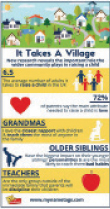It takes an average of 6.5 adults to raise a single child in Britain, with grandmothers (42%) teachers (37%), grandfathers (30%), aunts (23%) and older siblings (23%) all playing key roles alongside parents, according to the results of a study amongst British parents and children.
A quarter of those surveyed believe it takes as many as 10 people to bring up a child, highlighting the extent of those involved in raising a family in modern Britain.
More than two-thirds of those surveyed agreed that the main attribute needed to raise a child is love, with this ranking higher than being related to the child or regularly looking after them.
The surv ey, commissioned by My Nametags (www.mynametags.com) suggests that the proverb “it takes a village to raise a child” rings true for families across Britain, with members of the wider family and community playing important roles in a child’s upbringing. For instance, great reliance is placed on grandmothers (46%) and grandfathers (22%) for childcare whilst parents are at work. Children’s older siblings (19%), aunts (14%), and parents’ friends (12%) are also amongst those who are regularly called upon for childcare.
ey, commissioned by My Nametags (www.mynametags.com) suggests that the proverb “it takes a village to raise a child” rings true for families across Britain, with members of the wider family and community playing important roles in a child’s upbringing. For instance, great reliance is placed on grandmothers (46%) and grandfathers (22%) for childcare whilst parents are at work. Children’s older siblings (19%), aunts (14%), and parents’ friends (12%) are also amongst those who are regularly called upon for childcare.
Parents agree that older siblings have the biggest impact on a child’s personality (16%), as well as heavily influencing a child’s bad habits (25%). Grandmothers are also critical to forming the personality of a child, with a fifth of parents believing they have the closest rapport with their children. Additionally, grandmothers are considered to teach them the most of anyone in the family.
The influence of older siblings and grandmothers is also felt by children themselves, with a fifth stating they have the most fun with their older siblings and almost a quarter agreeing they look up to their grandmothers the most.
Interestingly, despite this village mentality, teachers are the only group outside the immediate family that parents are happy to let discipline their child.
According to the study, there are several reasons why parents choose to involve their wider social networks when raising children. In addition to practical reasons, parents suggest that it improves children’s social skills (30%) and helps them build strong relationships (30%).
Commenting on the findings, Bea Marshall, Parenting Expert and Founder of Yes Parenting, said: “Humans are generally social creatures who thrive in communal and cooperative environments. Nowadays it is common for families to live away from their extended families and without the day to day support of their immediate neighbours. However, it is still so important for families to create a network of support as they raise their children. When other people help care for children, it provides parents with an opportunity to recharge, work or play. Those other people also give children a secure set of relationships in which their needs for connection, safety and belonging are met. Children have an opportunity to learn from the different people around them and they receive different things from each person – one may be more playful, another more nurturing, for example. Each person in a child’s life contributes something unique that helps them to grow into a well-rounded individual, while offering crucial support to their parents.”
With everyday life in Britain affected by COVID-19, parents’ usual reliance on the wider community has never been more apparent, with many families losing over two-thirds of their support network.
Commenting on the research, Lars B. Andersen, Managing Director at My Nametags, said: “After noticing a range of family members ordering name labels for children in recent years, we were interested to discover more about the varying roles that family members and friends take on when raising a child. Although every household will have their own approach to parenting, it is interesting to see the importance of the wider community when raising children in the UK, and how each individual helps to shape a child’s life. With the impact of COVID-19 continuing to affect the way families across the UK are operating, it was particularly interesting to speak to parents about how being cut off from their usual support network has affected them during this crisis. We found that, on the whole, although families have adapted the best they can, they want to get back to their normal routine, suggesting that this unusual period has only reinforced the importance of including a range of people in the upbringing of a child.”
To learn more, please visit www.mynametags.com/blog/2020/ 06/it-takes-a-village/











